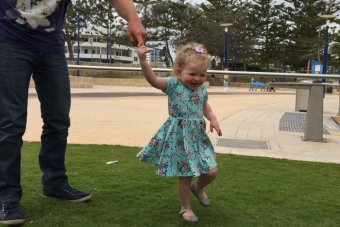Perth toddler diagnosed with melanoma; six new drugs approved for clinical trials
Source: ABC News, October 2014

Source: ABC News
Experts are reminding parents that melanoma does not discriminate, after a Perth toddler needed surgery to remove a tumour.
At just two years old, Frankie Prebble’s skin had seen barely any sun when she was diagnosed with the disease.
Her parents noticed a small pink spot on her arm, which grew and later began to bleed.
Australia has one of the highest rates of melanoma in the world, but they are not all the result of sun exposure.
Doctor Mark Lee operated on Frankie and said in this extremely rare case, the sun was unlikely to be the reason for the tumour.
“When you’ve got a little baby like Frankie who’s so young and had very little sun exposure, then there are obviously a lot of other factors at play here [like] genetics [and] the tumour biology," Dr Lee said.
“Melanoma can be a very different disease in different people."
Frankie’s case is one in 5 million.
And while Frankie has a 99.9 per cent chance of being cured of melanoma, she will need to be vigilant for the rest of her life.
Family visited three doctors before Frankie was diagnosed
Doctors have said while the chance of such a young child developing melanoma was incredibly rare, if left untreated, it could be as deadly as melanoma in adults.
After two surgeries, Frankie was left with what she calls her “brave scar", but no sign of the cancer.
“It doesn’t mean we rest on our laurels. We still need to follow her up very closely, probably lifelong, since she’s had something so early," Dr Lee said.
Frankie’s parents took her to three different doctors before being correctly diagnosed with melanoma.
“If there’s anything unusual that crops up on their child’s skin, just get it checked out, and even if you’ve still got this feeling that it’s not right, go get another opinion, and even another opinion," mother Michelle said.
While early detection and removal remains the ideal treatment at every age, there is hope for those with advanced stages of the disease.
“There’s a huge number of new drugs that are using the body’s immune system to fight melanoma, and some patients with advanced melanoma are seeing some very exciting results," Dr Lee said.
“A lot of these things are still very experimental, but I think it’s very exciting. It was a fairly dismal prospect if you had metastatic melanoma even a few years ago."
Six new drugs have been approved, although they are very expensive and will only be accessible to Australians through clinical trials.
Melanoma researcher Professor Meenhard Herlyn, who is based in the United States and is in Perth for the second International Melanoma Conference, said Australia was leading the way in treatment.
“This is an incredible development that is better than any other cancer," he said.
“So we think that we now have a whole battery of options for patients, young and adult, so that is really a game change in the field."
